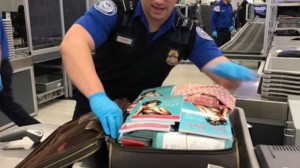 Air travel in the U.S. may be about to get a bit worse for the literate, as the Transportation Security Administration is reportedly testing a new requirement for passengers to remove books and other paper items from their carry-on luggage during security screening. While the TSA says the proposed new policy arises only from scanning machines’ limitations in discerning explosives from other contents of packed bags, there is no doubt that privacy concerns can and will arise.
Air travel in the U.S. may be about to get a bit worse for the literate, as the Transportation Security Administration is reportedly testing a new requirement for passengers to remove books and other paper items from their carry-on luggage during security screening. While the TSA says the proposed new policy arises only from scanning machines’ limitations in discerning explosives from other contents of packed bags, there is no doubt that privacy concerns can and will arise.
Testing of the new procedures quietly began last month at a handful of small airports including Colorado Springs, Boise, and Lubbock. Since that time, according to the Wall Street Journal, passengers at larger airports have also encountered new rules on paper goods but those rules may “change line by line, airport by airport.”
Although the TSA claims that books and paper goods simply cause too much clutter on scanning screens, even prior to the new rules there were many documented cases of the agency’s employees giving increased scrutiny to passengers perceived to be carrying suspicious reading material. In 2010, for instance, the ACLU represented Nick George, a college student who was handcuffed, detained, and interrogated at Philadelphia International Airport while carrying a set of Arabic-English flashcards and the book Rogue Nation by Clyde Prestowitz–a former Reagan Administration official who was critical of foreign policy under George W. Bush.
Nick George was released without charge after five hours, but successfully sued the Philadelphia Police Department for damages and a revision of the department’s policies to make clear that officers must establish probable cause for arrest beyond a TSA employee’s vague or uninformed suspicion. Of course, that reform only applied to Philadelphia; the same scenario could still be repeated at other airports around the country. There are also many more passengers who may not exactly risk arrest for their reading material, but simply prefer to keep it private as is their right. In a blog post, ACLU policy analyst Jay Stanley outlined just a few reasons that travelers might not want strangers perusing their choice of reading:
A person who is reading a book entitled “Overcoming Sexual Abuse” or “Overcoming Sexual Dysfunction” is not likely to want to plop that volume down on the conveyor belt for all to see. Even someone reading a bestseller like “50 Shades of Grey” or a mild self-help book with a title such as “What Should I Do With My Life?” might be shy about exposing his or her reading habits.
If the new procedures really are just designed to cut down on clutter in bags, Stanley points out, there should be no reason that passengers can’t carry their books and papers inside of an opaque wrapper or other thin receptacle which could be easily pulled out and placed on the conveyor belt, similar to the current rules for liquids in quart-size bags. TSA agents could still require that books and papers be separated if they spot an anomaly on the scanner, but for now a simple folder, sleeve, envelope, or book cover may be the best stopgap measure for passengers hoping to preserve their reading privacy to the greatest extent possible.
The reported new screening rules for paper goods add to an increasingly chilly atmosphere for travelers both within the U.S. and coming from abroad. In recent months the Department of Homeland Security has also proposed requiring refugees, visa holders and other foreign visitors to relinquish information about their social media accounts as a condition for entry to the country–prompting a coalition of 29 advocacy organizations to launch the Fly Don’t Spy campaign in protest.
Additionally, CBLDF has developed numerous legal advisories for people crossing borders with potentially sensitive reading material, including comics and manga:
- Advisory: Crossing International Borders
- Legal Memorandum Regarding Canadian Customs and Manga
- List of Comics Seized by Canadian Border Officials
Help support CBLDF’s important First Amendment work in 2017 by visiting the Rewards Zone, making a donation, or becoming a member of CBLDF!
Contributing Editor Maren Williams is a reference librarian who enjoys free speech and rescue dogs.